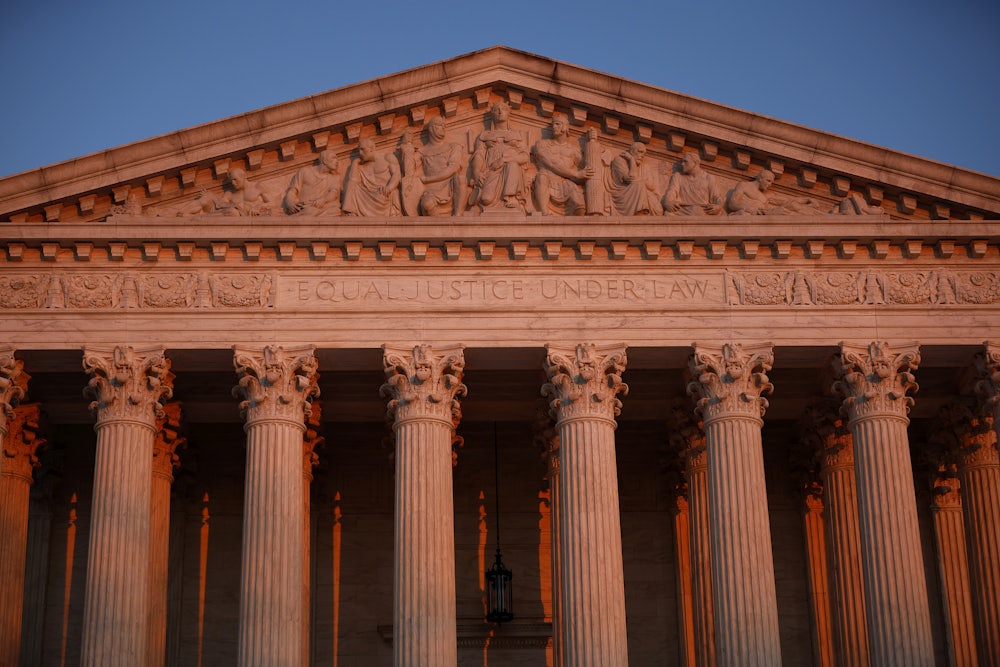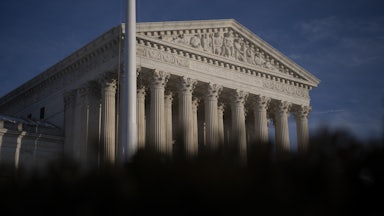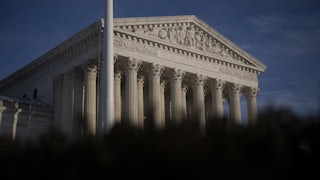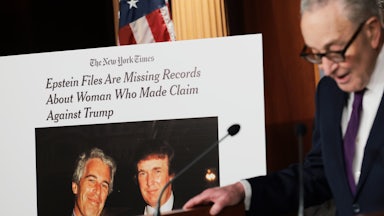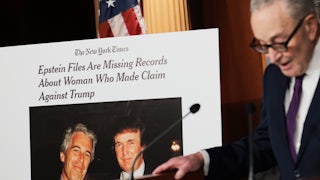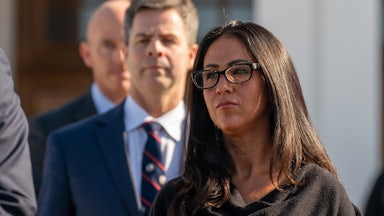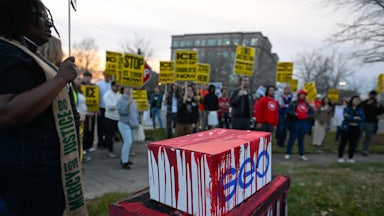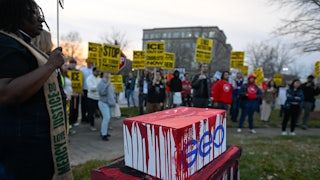Americans are a litigious people. But there are some people that even Americans can’t sue for wronging us. One of the most surprising categories is that of the prosecutor. Despite their immense power over justice and injustice for tens of thousands of people, prosecutors are generally immune from federal civil rights lawsuits. The Supreme Court may soon decide whether to take up a case that could pare back prosecutors’ absolute immunity after years of criticism and skepticism about its scope.
The case, Price v. Montgomery County, comes from Kentucky. In 2018, Nickie Miller sued a group of state law enforcement officials in federal court for allegedly conspiring to frame him for the murder of Paul Brewer, the brother of a former state trooper who had been found tied to his bed and shot to death seven years earlier. Four years of investigation by the police failed to surface a suspect for the killing.
But that changed after officers received tips from jailhouse informants that led them to a woman named Natasha Martin. During a police interrogation, she claimed that she, Miller, and a few others had taken part in the murder, with Miller firing the fatal gunshots. Miller was jailed for two years before prosecutors eventually dropped the charges against him.
A key part of the lawsuit centers on the actions of Keith Craycraft, an assistant state prosecutor. Both sides of the lawsuit agree that Martin almost immediately sought to retract her confession. She also wrote letters while in jail that recanted her confession, which she said had been extracted through coercive means. A Kentucky court ordered the jail to turn over the letters at the request of Miller’s lawyers.
After the court’s order came down, Craycraft spoke with Martin by phone. The two sides disagree on exactly what happened next. Miller’s estate—he died while midway through litigation—alleged that Craycraft instructed Martin to destroy the exculpatory letters. (I’ll keep referring to the plaintiff as “Miller” for continuity’s sake, even though his daughter is now the named litigant.) Craycraft said in a deposition that he simply advised Martin to contact her own lawyer for further advice. In any event, the letters central to the matter subsequently disappeared.
Miller’s original lawsuit alleged a broader conspiracy within Kentucky’s law enforcement apparatus. But the legal issues in his estate’s petition for the Supreme Court are more narrow. After the lawsuit was filed, Craycraft moved to dismiss it on the basis of absolute prosecutorial immunity. He argued that Section 1983, the federal law invoked by Miller for his complaint, did not allow lawsuits against him for the actions he allegedly committed.
A federal district court judge in Kentucky agreed, as did the Sixth Circuit Court of Appeals. Courts assume that the plaintiff’s facts are true when deciding motions to dismiss, so the rulings operated from the assumption that Craycraft did tell Martin to destroy the letters. Even then, they concluded that Craycraft was entitled to absolute immunity for allegedly destroying evidence, despite a court order.
“The behavior Miller describes in his complaint is difficult to justify and seemingly unbecoming of an official entrusted with enforcing the criminal law,” the Sixth Circuit panel’s majority noted, perhaps with some understatement. “At the same time, Craycraft has met his burden of establishing that the conduct at issue was committed in his role as prosecutor, rendering him immune from suit.”
From where does this immunity spring? In 1871, Congress passed the Enforcement Act to address deprivations of rights in the postwar American South. One of its provisions, now known as Section 1983, allows people to sue state and local officials in federal court for violating their federal constitutional rights. This power is not unlimited, however. The courts have recognized various forms of legal immunity from Section 1983 lawsuits over the years for public officials.
Most state and local officials enjoy what is known as “qualified immunity,” in the sense that they enjoy immunity with some qualifications. Generally speaking, those officials can’t be sued unless they violate a “clearly established” constitutional right. Three groups of officials—judges, legislators, and prosecutors—enjoy absolute immunity, meaning that they can’t be sued for their official acts at all.
Qualified immunity became a highly controversial doctrine in recent years, as myself and many others have noted before. Judicial immunity and legislative immunity are widely accepted both as a matter of legal principle and on pragmatic grounds. But prosecutorial immunity, compared to the other two forms of absolute immunity, is far more recent—and also more contested.
When the Supreme Court revived Section 1983 in the mid-twentieth century, the justices also began to outline limits to its scope. They first declared that prosecutors enjoy absolute immunity from Section 1983 lawsuits in the 1976 case Imbler v. Pachtman. That case centered on a former death-row inmate in California who had been exonerated based on evidence that he believed had been withheld by a Los Angeles prosecutor before his trial.
In a 8–0 decision, the court rejected his lawsuit. It argued that prosecutors enjoyed a form of absolute immunity that derived from judicial immunity. “The common law immunity of a prosecutor is based upon the same considerations that underlie the common-law immunities of judges and grand jurors acting within the scope of their duties,” Justice Lewis Powell wrote for the court.
Powell also emphasized what he and his colleagues saw as practical concerns with allowing Section 1983 claims against prosecutors. “These include concern that harassment by unfounded litigation would cause a deflection of the prosecutor’s energies from his public duties, and the possibility that he would shade his decisions instead of exercising the independence of judgment required by his public trust,” he continued.
Justice Byron White and the court’s two most liberal members, Justices William Brennan and Thurgood Marshall, concurred only in the court’s final judgment. White wrote that the allegation put forward by the plaintiff—that the prosecutor should have known that the testimony was false—was insufficient for a Section 1983 claim, and so the case should fall. But he parted ways with the majority on their argument for prosecutorial immunity.
“It is by no means true that such blanket absolute immunity is necessary or even helpful in protecting the judicial process,” White wrote. “It should hardly need stating that, ordinarily, liability in damages for unconstitutional or otherwise illegal conduct has the very desirable effect of deterring such conduct. Indeed, this was precisely the proposition upon which Section 1983 was enacted.”
While the Imbler court suggested that its ruling did not address all aspects of a prosecutor’s job, later decisions interpreted it broadly. The Supreme Court has typically only rejected prosecutorial immunity when prosecutors perform acts outside their official functions. In the 1991 case Burns v. Reed, for example, the Supreme Court upheld absolute immunity for a prosecutor’s charging decisions but not for legal advice that he gave to police officers during an investigation.
Justice Antonin Scalia wrote a separate opinion in Burns where he concurred only with the court’s judgment. He also noted, almost in passing, that he was skeptical of Imbler’s reasoning. “[Imbler] relied for that holding upon a common law tradition of prosecutorial immunity that developed much later than 1871, and was not even a logical extrapolation from then-established immunities,” he wrote, referring to the year that Section 1983 became law. “While I would not, for the reasons stated above, employ that methodology here, the holding of Imbler remains on the books, and for reasons of stare decisis I would not abandon it.”
In the Sixth Circuit ruling against Miller, one of the panel’s members, Judge John Nalbandian, followed Scalia’s lead and parted ways with his colleagues on the immunity analysis. In footnotes, he pointed to recent scholarship that casts doubt on prevailing legal views about qualified immunity’s legitimacy on originalist grounds. But as a lower court judge, he had much less flexibility than a Supreme Court justice about when and how he can apply precedent.
For that reason, Nalbandian wrote, Craycraft was entitled to absolute immunity on the portions of his claims about advising a witness to destroy evidence. But he argued that absolute immunity did not apply to the allegations that Craycraft had violated a court order, as Miller had alleged. Prosecutorial immunity is grounded in the idea that it protects a prosecutor’s discretion, he wrote, but that discretion does not apply when it comes to a court order. Even then, he wrote, he would still hold that Craycraft was entitled to qualified immunity since the allegedly violated right was not “clearly established.”
In his petition for review, Miller argued that the justices should take up the case because the lower courts are divided on how absolute immunity applies in these cases. Some of the federal appeals courts have held that destruction of evidence falls under the prosecutor’s discretion about what to present to a jury. The Third Circuit, on the other hand, previously held that destroying exculpatory evidence does not fall within a prosecutor’s duties, and is therefore not entitled to immunity.
The Sixth Circuit’s ruling against Miller expanded that split in the lower courts. While the Supreme Court is generally free to take up cases for whatever reason it chooses, it often takes them up to address divided interpretations of federal law in the lower courts. While the Kentucky solicitor general’s office claimed in a header that there was no circuit split, it more or less conceded that one exists in its actual argument.
“What matters is if something is done in the role of an advocate,” the state argued in its reply brief. “Indeed, offering false testimony and suppressing exculpatory evidence are both plenty egregious. But both get absolute immunity. In short, the Third Circuit’s view strays from this Court’s cases. True, the Court could fix that with a grant. But correcting one circuit in clear conflict with the caselaw hardly seems worth it here.”
Does it? That may seem strange, if not bizarre, to the average American. Why on earth should prosecutors get absolute immunity from being sued when they destroy evidence? What interest of justice does that serve? Judges from 1976 to the present day have asked that same question when confronting the swampy grounds upon which prosecutorial immunity is built. If the court takes up this case for the next term, the justices may consider whether a course correction on immunity is warranted.
